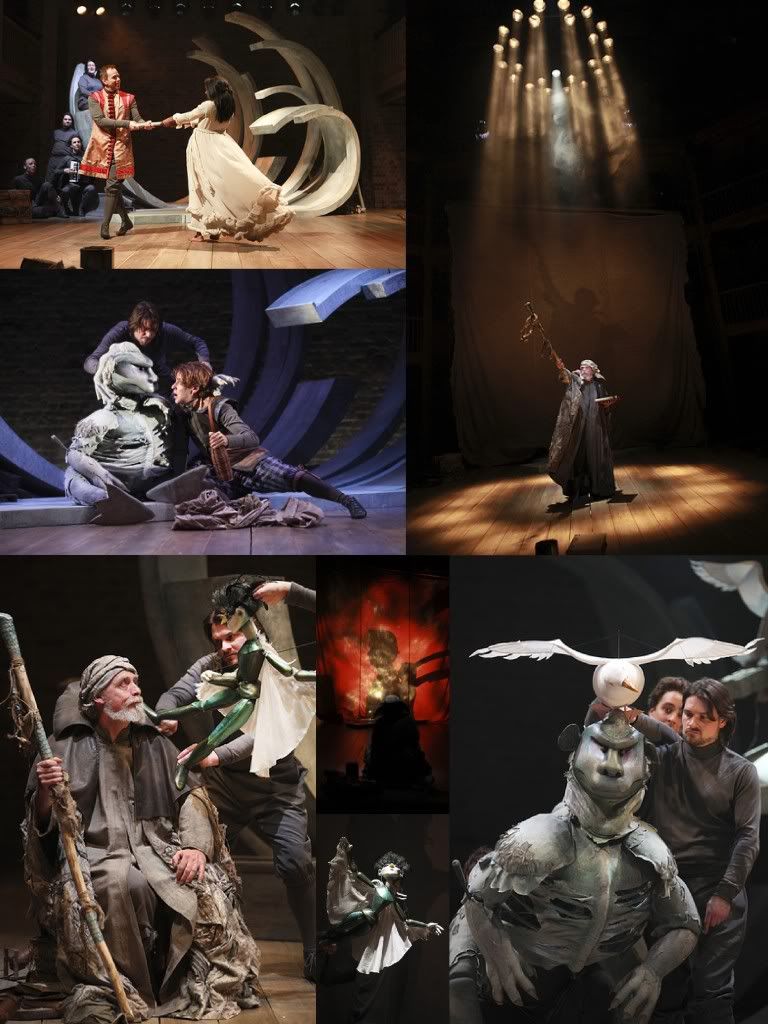Oh, I truly loved this co-production between the RSC and the Little Angel Theatre and was shocked recently to see the London run getting a two star review. All I can say is that I think the reviewer was completely wrong and also possibly a bit of a miserable fart as comparing a brutal Russian production of the play to a version designed for children is rather missing the point, especially as part of the joy of the Tempest is that it can take such polar opposite productions. And this one was utter magic from start to finish, filling me with a childish sort of wonder and glee that is exactly what I want to feel in the theatre and exactly how I would want children to first experience Shakespeare.
A lot of this wonder was down to how the production handles the magic within the play – here they used a mixture of lighting, projections and shadows, and a number of physical effects to realise it. Prospero using his staff to strike up the storm like a match against the bare beams of the stage, or a mirror hidden inside a book reflecting dancing light around the theatre are beautifully simple and wonderfully effective. Similarly the use of puppets allow them to create characters and situations that immediately remove us from the “real” world and can take us somewhere incredible. I thought Caliban particularly was wonderful – both magical and instantly relatable and emphatic (I believe that when done well it is, truthfully, easier for people to empathise with puppets – that’s a large part of their charm for me – and the ending, with the seagulls settling upon Caliban offered a tremendous sense of peace).
I also loved the way that the production invited its audience in – partly because we could see and understand how effects like the dresses transforming into hounds worked, allowing us to be part of the process but mostly through audience/actor interaction. This took a wide range of forms – from the bawdy comedy of Brett Browns’ Stephano “throwing up” into an audience members lap and then using their coat to wipe his mouth, highlighting a vividly bright cartoony aesthetic that characterised the shipwrecked. Right through to incredibly powerful moments like David Fielder’s marvellously twinkly and warmly curmudgeonly Prospero addressing each section of the audience in turn, highlighted by the lighting for his “Ye elves of hills, brooks, standing lakes and groves...” speech (incidentally one of my favourite Shakespearean speeches). We became his island spirits.
Adding to this enchanted atmosphere was a richly romantic score provided by the actors themselves - perched on the rocky outcrops of the set (reminiscent of the carcass of a ship and very versatile). The instruments chosen - cello, clarinet, accordion, and flute, accompanied by harmony singing – are all instruments I consider to be very warm. The songs themselves served as a fresh, inventive source of exposition and a way to explore emotions that may have been less immediately obvious for some of the younger audience. I thought, in particular, they added a very sweet aspect to the somewhat sudden romance between Ferdinand and Miranda. This was also highlighted by the beautiful projections and symbolic imagery used during the engagement feast. I also really liked how they highlighted the childishness of the doll-clutching Miranda, played by Anneika Rose who I saw previously at the RSC playing Juliet. The character behaving not only as a conscience, but also as a viewpoint character for the young audience.
A beautiful and magical production and a wonderful introduction to Shakespeare, which never dismisses its young target audiences’ intelligence but manages throughout to engage with their imagination.

No comments:
Post a Comment